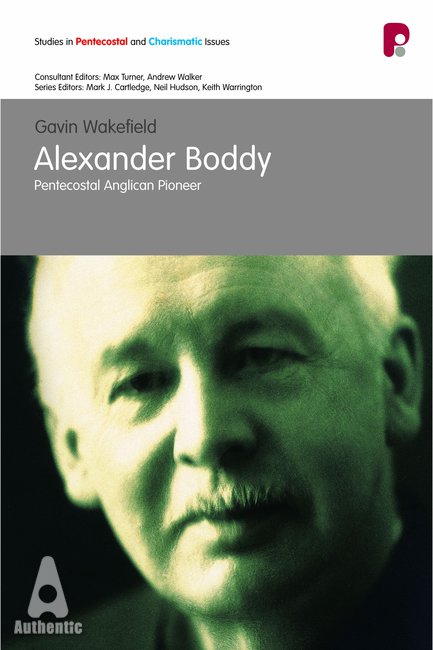Gavin Wakefield: Alexander Boddy
 Gavin Wakefield, Alexander Boddy: Pentecostal Anglican Pioneer (London, UK/Colorado Springs, USA: Paternoster, 2007), 245 pages, ISBN 9781842273463.
Gavin Wakefield, Alexander Boddy: Pentecostal Anglican Pioneer (London, UK/Colorado Springs, USA: Paternoster, 2007), 245 pages, ISBN 9781842273463.
Wakefield’s text is well placed as part of Paternoster’s Studies in Pentecostal and Charismatic Issues series. For one thing, Boddy was unarguably a most important founder and leader in early Pentecostalism in Great Britain, and he also had vital international significance including the United States. Even more, his life and ministry intersected with and addressed at one point or another most of the main issues that arose during that time, many of which are still relevant—and controversial—in the movement and beyond. Thus, this scholarly and readable historical biography of A. A. Boddy has interesting applications for the present. Its emphasis on Boddy’s personable leadership style, wide travels, mediating theology, and pastoral heart suggest it may be most helpful for church leaders and pastors, but there is also much for scholars and students. As a special point of interest, Boddy, a Church of England clergyman who also interacted with many cultures and traditions, is a Pentecostal model of ecumenism and egalitarianism. Oddly enough, he has been understudied, probably because after the interruption of World War I, younger men began to lead the movement. Yet his influence continued (and continues) to be significant in subtle ways. For example, Boddy’s motto, “unity is not uniformity,” is often quoted without credit. Accordingly, Wakefield’s work is a welcome look at this important figure and leader in early British Pentecostalism and beyond. In a helpful Forward, acclaimed New Testament scholar and Bishop of Durham N. T. Wright said, “Those who pray for a fresh work of the Spirit on our own day will do well to learn from such earlier events.” I agree.
“Unity is not uniformity.”
— Alexander Boddy
Wakefield does a good job of concisely summarizing the most salient features of Boddy’s characteristics and contributions. He speculates that Boddy’s upbringing in a poor area with heavy immigrant population and mixed religious faiths may have been formative for later years of social concern and ecumenical and inter-religious understanding. He underscores Boddy’s evangelical orientation prior and subsequent to his Pentecostal experience. He suggests wide traveling and wide ranging relations with Christians of many different denominations and even with people of non-Christian religions helped him attain an unusually inclusive outlook that nevertheless did not diminish constant commitment to his own faith or to his sense of the Church’s evangelistic mission. Boddy seems to have been an adventurous spirit who, though perhaps not a great scholar, was a careful observer and learner, and became a prolific speaker and writer.
Category: Church History, Fall 2009


